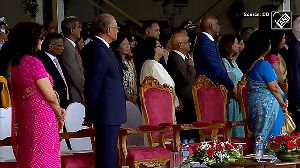Over the years I have followed a very simple rule of the thumb on economic decision-making: Whatever the Communists say, the opposite of it must be right.
Similarly, on Indo-Pak relations, if hardliners like Qazi Husain Ahmed of Pakistan's Islamic fundamentalist party, the Jamaat-e-Islami, oppose something, the opposite must be the sensible thing to do. Therefore, when hardliners in Pakistan criticised the compromise between the two countries on the documentation required for people wanting to use the bus service between Srinagar and Muzaffarabad, my first reaction was that there must be something right in the deal that the two foreign ministers struck in Islamabad.
The issue of the bus service across the Line of Control however goes beyond the reaction of hardliners and peaceniks. It is perhaps the single most significant confidence building measure that has been undertaken by the two countries on an issue -- Kashmir -- that has bedevilled their relations since Partition. More than a humanitarian gesture, the bus service is a political statement, the import of which will be realised in times to come.
The humanitarian aspect of this CBM (Confidence Building Measure) has in fact been somewhat overstated. Frankly, there are only a handful of divided Kashmiri families and if the primary purpose was to allow divided families to meet then other steps like designating areas along the LoC where people from the two sides can come and meet their relatives would have served the purpose better. The problem of divided families is more in the Jammu region and a bus service between Mirpur and Jammu would address this issue much better than a bus service between Muzaffarabad and Srinagar.
Nevertheless, to the extent that the bus service helps assuage the Kashmiris, it will have played its role in managing the problem. By dropping its insistence on passports and visas, the Indian side has demonstrated a remarkable degree of flexibility. This will steal the thunder from hardliners inside Pakistan who have been blaming Indian 'rigidity' for the lack of any forward movement on the issue of Kashmir and using this to question the utility of the peace process. The bus service will therefore come as shot in the arm for the growing peace lobby inside Pakistan.
In a sense, the bus service across the LoC is yet another experiment by India to test its long held belief that greater and closer people to people contacts between India and Pakistan will create a situation in which issues like Kashmir will lose their stridency and primacy.
What is more, when people from the Indian side travel to Pakistan-occupied Kashmir, the difference in terms of economic and political development will become clear to them. Culturally too, the Kashmiris will find out that except religion, they have very little in common with the Kashmiris living under Pakistani occupation.
If anything, the bus service will be just among a series of such ventures that will be started between the two countries. It is now only a matter of time before there is a clamour for starting a similar service between Mirpur-Sialkot and Jammu and between Skardu and Kargil. The momentum thus created will then extend to the rest of the international border and movement between the two countries will be lot easier than it is at present. This will in time create economic, trade and cultural linkages and thus develop vested interests in peace.
The proposal for a bus service between Amritsar and Lahore and rail link between Khokrapar and Munabao are steps in this direction. The growing contact between the two Punjabs has already led to a sea change in the attitudes of the people in Pakistani Punjab, the province which has been blamed for assiduously cultivating hostility with India.
While the fledgling peace process between India and Pakistan will receive a fillip with this move, there is a danger lurking in the background. The Indian side has backed off on all its earlier demands as far as documentation for travel across the LoC was concerned. Henceforth, no passports or visas (symbols of nationality and sovereignty) will be used. Instead a system of entry permits has been re-introduced. While it can be argued that the entry permits are passport/visa by another name, yet in diplomacy nomenclature is as important as substance.
The danger is that the Pakistani side might perceive the Indians as being a little too keen to strike a deal. What is more, the backtracking by the Indians might be seen by sections of the Pakistani establishment as a weakening of Indian resolve to not compromise on either territory or sovereignty in Kashmir. The Pakistanis are known in the past to have made such serious miscalculations and over-playing their hand.
In fact, criticism within India of the agreement on the bus service centres on this one point. The argument being made by the critics is: What was the point in insisting on passports and visas when in the end this condition was going to be given up? It's a terrible negotiating strategy to make a demand and then back off from it so completely. This tends to send negative signals to the other side. If in the view of the Indian foreign office, the passports and visas were such important documents that their absence would compromise Indian sovereignty, then India should never have resiled from its position.
But if these were not critical documents, then why make them such a big issue in the first place?
A good negotiating strategy is one in which you raise a demand which you know will never be met; with a fall back position which will get you what you wanted in the first place. This cardinal principle of diplomacy appears to have been ignored in the negotiations on the bus service across the LoC.
Notwithstanding the chances of Pakistan misconstruing Indian resolve on Kashmir, it cannot be ruled out that India deliberately adopted a maximalist position on the documentation knowing that it will be rejected and then negotiated a deal which treated Kashmiris on par with rest of the citizens of India.
Since India claims that the entire state of Jammu and Kashmir is a part of India, use of passports and visas for travelling between two parts of India would be an acknowledgement of Pakistan's legitimacy in areas of Jammu and Kashmir occupied by it. So, not only has the Indian side won some important concessions from the Pakistani side, it has also won diplomatic brownie points by making a show of its flexibility.
What is more, this move has scotched the irresponsible talk in some quarters in India to get a tacit Pakistani acceptance on converting the LoC into an international border.
Other than the documentation, security was another big concern in allowing movement across the LoC. This issue has been suitably addressed in the deal that was struck in Islamabad with the inclusion of the provision 'once identities are verified.'
The interpretation of this phrase and the procedure that will be laid out in its pursuit will ensure that movement across the LoC is strictly regulated. It is not as though anyone can simply walk across the LoC or sit in the bus and go to the other side. Instead, once 'identities are verified,' the list will be forwarded to the other side, which can refuse to give an entry permit at the immigration check posts that will be set up for the purpose of movement of people.
All in all, the agreement on the Srinagar-Muzaffarabad bus service is still at an experimental stage. To start with, the frequency of the bus service is likely to be once a week. As things improve, and export of violence from Pakistan reduces, the frequency will increase. Also, once the bus starts, the public pressure will mount to increase the frequency as well as open other routes, both along the LoC and the international border.
In this sense, this is probably the first tentative step in breaking the iron curtain that has existed between India and Pakistan. Equally important, the agreement has given a new lease of life to the ongoing dialogue process between the two countries, which was seen to be floundering on account of lack of progress on any of the issues under discussion.






 © 2025
© 2025